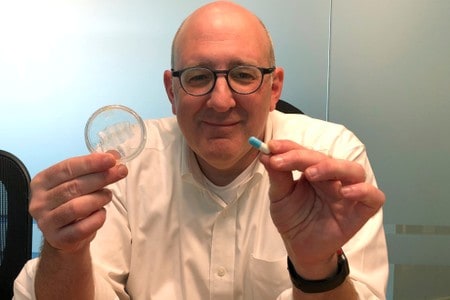By Steven Scheer
TEL AVIV (Reuters) – Israel’s Intec Pharma, which is conducting a late stage trial for its long-lasting pill to treat Parkinson’s disease, expects to start earning money from the program sometime in 2019.
Intec recently completed enrolling 462 patients for a Phase III trial for the pill that opens up like an accordion, with the levodopa drug remaining in the stomach for 8-12 hours, requiring fewer doses a day. Results are expected in mid-2019.
The Phase II trial showed a 45 percent reduction in “daily off time,” which gave patients more than two extra hours a day of movement.
“I feel very comfortable that we have an approvable program here. I would like to see as big an effect size as possible, but there is commercial viability at any effect size,” Jeffrey Meckler, Intec’s chief executive, told Reuters after a news conference on Wednesday.
“I hope next year we will be able to monetize value out of the Parkinson’s program, whether that is the sale of the company, sale of the program or a license partnership,” said Meckler, who took over in July 2017.
He said a large number of Parkinson’s companies were interested in the program but he declined to elaborate.
Assuming a 10 percent market share, Meckler said: “We have a drug that is worth more than $300 million a year.”
The drug would likely compete with Amneal Pharmaceuticals’ Rytary, which also reduces the amount of off-time.
Intec is also looking at a pill-based delivery for medical cannabis and has begun early stage trials.
“The cannabinoid program has much bigger potential than Parkinson’s,” Meckler said, adding the company aimed to license out drug delivery of medical cannabis prior to Phase III trials.
Intec’s strategy is to look for existing drugs and put them into its delivery platform, in which medicine is folded up in a film with layers that opens like an accordion.
Intec is working on trying to adapt its platform for an undisclosed drug from Novartis and a decision is expected on its viability in early 2019, said Meckler.
The Nasdaq-listed company raised $35 million in the second quarter, helping to fund the Parkinson’s trial. While not yet profitable, Intec had $66 million in cash at the end of June and is burning about $10 million a quarter.
“We don’t expect to raise money again before the Parkinson’s data” next year, Meckler said.
(Reporting by Steven Scheer; Editing by Mark Potter)


